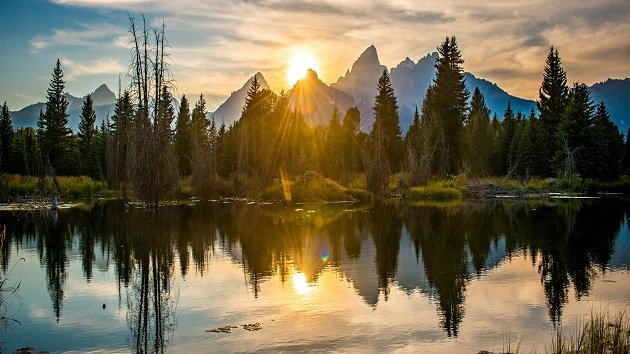-
 play_arrow
play_arrow
WMEX WMEX Boston
-
 play_arrow
play_arrow
Courage To Hope-Episode 82-Michael Courage To Hope-Episode 82-Michael
Researchers working to save whitebark pine, a declining keystone tree species in the greater Yellowstone area
todayApril 23, 2024

Getty Images – STOCK
(TETON COUNTY, Wyo.) — This Earth Day, ABC News is taking a look at solutions for issues related to climate change and the environment with the series, “The Power of Us: People, The Climate, and Our Future.”
A critical tree species found in some of America’s most revered national parks is in decline, leading researchers to embark on a race to prevent more from dying off.
Whitebark pine, or Pinus albicaulis, is a keystone tree species found in the greater Yellowstone area, play a critical role in the ecosystem in the greater Yellowstone area, Laura Jones, branch chief of vegetation ecology at Grand Teton National Park, told ABC News.
But the already few whitebark pine trees that exist on the rooftops of the Teton mountain range are dwindling quickly, and the impacts — while still unknown — could be a major disruption to the ecosystem, experts said.
“If we lose the keystone species, we don’t totally know what’s going to happen,” Nancy Bockino, research associate at the Northern Rockies Conservation Cooperative, told ABC News. “It’s like losing the roof of your house.”
Protections for whitebark pine under the Endangered Species Act were enacted in 2022 after the U.S. Fish and Wildlife service concluded that the species was likely to become endangered in the foreseeable future.
White pine blister rust, a non-native invasive fungus that slowly kills the tree, has wiped out more than 325 million whitebark pine trees and remain the primary threat to the species, according to the U.S. Fish and Wildlife Service. Conservationists have seen a high mortality rate among trees that become infected with blister rust, Jones said.
The species is typically found across western North America, from northern California to British Columbia, Canada. Because these high-elevation and high-latitude environments that house whitebark pine typically have a cold and windy climate, the increase of global temperatures is likely affecting survival rates for the trees, the experts said.
Since the forest is no longer freezing as often during the fall and spring, a native pine beetle has been able to spread its population and further weaken the trees, Jones and Bockino said.
Higher temperatures could also cause the plants to become water stress, further exposing the trees to invasion from the expanding number of beetles, Jones said.
Whitebark pine are critical to the local ecosystem because they provide high-energy food source for animals and also plays an essential role in slowing runoff from snowmelt and reducing soil erosion, according to the U.S. Fish and Wildlife Service. They can grow to up to 60 feet and live well past 1,000 years old, according to the National Park Service.
One of the key steps to conserving the species is identifying the trees that are resistant to the pine rust and promoting those trees on the landscape, Jones said.
Researchers are also working on protecting seed source trees from the mountain pine beetles, which involves hanging pouches with synthetic version of the beetles on the tree, Bockino said. This signals to other beetles that the tree is “too full” and that there is “not enough for everyone,” she said.
Bockino described the current status of species as being in a “precarious situation.”
“If we aren’t mindful of how we take care of them, they could become extinct,” she said.
Some initiatives from the Inflation Reduction Act and bipartisan infrastructure law are enabling multiple agencies to work together to obtain more seed from cones to grow out plants Grand Teton and Yellowstone national parks, Jones said.
“As a keystone species of the West, extending ESA protections to whitebark pine is critical to not only the tree itself, but also the numerous plants, animals, and watersheds that it supports,” said U.S. Fish and Wildlife Service Regional Director Matt Hogan said in a statement in December 2022.
Copyright © 2024, ABC Audio. All rights reserved.
Similar posts
CONTACTS
- https://wmexboston.com
- 781-834-WMEX(9639)
- studio@wmexboston.com
- 130 Enterprise Dr, Marshfield, MA 02171
ABOUT
WMEX Boston can be heard at 1510 AM, and 101.1 FM. Playing the greatest hits from 50s, 60s, 70s, 80s, and more!
MENU
SPONSORS
Copyright 2024 WMEX Boston - Design by Pro Radio Solutions




